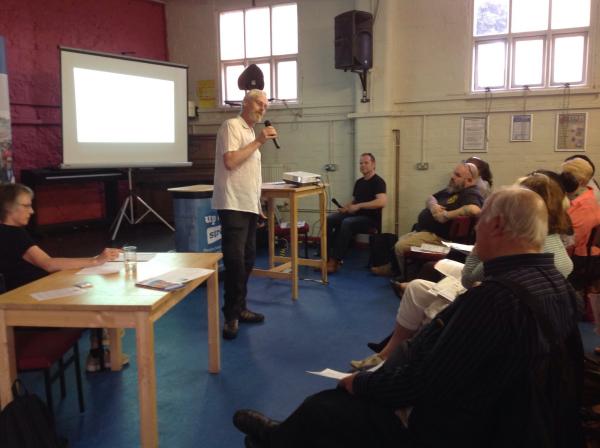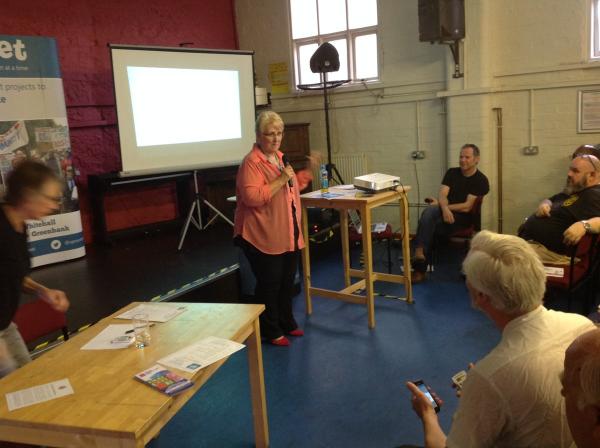The latest Easton & Lawrence Hill Forum held on Wednesday evening at Easton’s Pickle Factory attracted some 40 lively, vocal residents who’d come along to the event whose theme was waste management and its attendant problems such as litter and fly-tipping.
After the initial announcements, your ‘umble scribe was first out at the front of the hall to administer death by PowerPoint, giving a brief history of Tidy BS5, its activities and successes over the past two and a half years and calling for residents to act as the eyes and ears of Bristol City Council to combat fly-tipping, report litter and urging them to report other environmental crimes that blight the inner city such as fly-posting, dog fouling and graffiti. The Tidy BS5 slot finished with a showing of the “Green Capital Tale of Two Cities” video produced for viewing at full council last year.

I was followed on the microphone by Tracy Morgan, CEO of Bristol, the wholly-owned council waste company responsible for keeping the bins emptied and the streets tidy.

This was the main talk of the evening and Tracy gave some background of Bristol Waste’s work, which stretches from carrying out some 17 mn. waste collections around the city to clearing its streets of dead animals. Those collections yield an annual total of 140,000 tonnes of waste and recycling, of which 53,000 tonnes is sent for recycling or composting.
Tracy remarked, “We want to create a cleaner, greener Bristol… but waste is a shared responsibility,” before going on to the main point of her presentation – the 12 weeks-long trial to remove communal bins (otherwise known as skipbins or 1280l Eurobins. Ed.) from the Stapleton Road corridor.
The communal bins were introduced some years ago with a typical botched BCC consultation to attempt to tackle the problem of fly-tipping in the area. The communal bins consultation carried out last year (posts passim) clearly revealed that the introduction of the communal bins had failed in this respect.
Instead of the thrice-weekly communal bin collections, those streets where residents have sufficient storage space will be issued with 180l wheelie bins to be emptied fortnightly. Where this is not possible, residents will be given rubbish bags (hopefully gull-proof. Ed.) for collection on Mondays, Wednesdays and Fridays, to be put out at a certain time.
After Tracy’s presentation came questions and comments from the audience to a panel comprising, Tracy, Tom Ward from enforcement and myself.
There was lots of intelligence offered to Tom, particularly as regards fly-tipping along the Lawrence Hill/Church Road corridor, although the main concern was the Stapleton Road trial and the communal bins.
One resident spoke passionately for retaining on Claremont Street and Seymour Road (which are regularly abused, like all the other communal bins within the proposed trial area. Ed.). However, I feel she’s on a hiding to nothing with her desires and she was the only person in the room defending the communal bins that other residents described as the bane of their lives and a health hazard since they attracted rats.
Other residents wanted to see more litter bins, particularly in parks and along the Bristol & Bath Railway Path, whilst the operation of the St Philips Recycling Centre (e.g. no pedestrian access) and the surly, unhelpful attitude of the Centre’s staff were also mentioned to Tracy for attention, as were the habit of recycling crews leaving “offerings” in the streets for the local gods and the reaction of certain street sweepers to local residents trying to help them.
No doubt this will be a matter to which forthcoming Neighbourhood Forums will return.
The photos used in the post are by kind permission of Up Our Street.